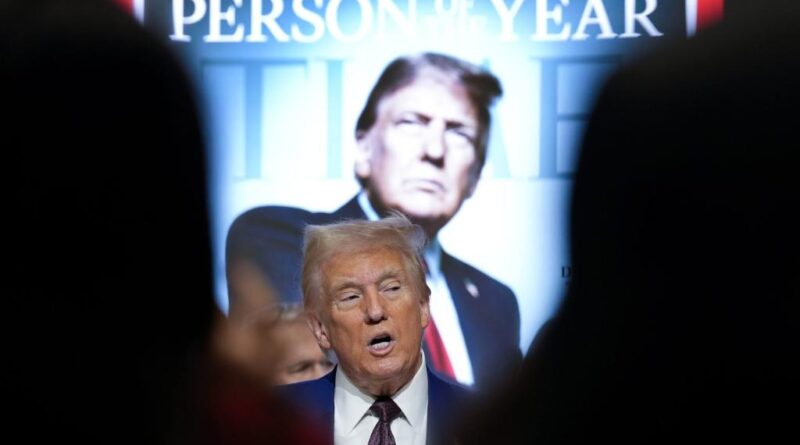A New Era of Politics Emerges as Leaders Worldwide Lose Their Grip on Power

Has anything notable occurred recently? Let’s take a look…
On November 5, Donald Trump, having emerged from a political grave and narrowly escaped an assassination attempt, achieved a significant victory over Kamala Harris in the presidential election.
This defeat for the Democrats represented more than just a loss; it signaled the collapse of “our democracy” — a regime so convinced of its own righteousness and scientific merit that it assumed it would endure indefinitely.
Just two days later, the German government fell apart, allegedly due to budget disputes, but in reality, it stemmed from personal animosities among the leaders.
The German economy is struggling, and despite ongoing conflicts, the political class appears clueless about how to address it. However, elections are scheduled for early next year.
On December 3, in a bid to gain leverage amidst a political battle with the opposition majority in parliament, South Korea’s president declared martial law. He claimed his opponents were merely “Commie puppets” of Kim Jong-un and argued that democracy should be set aside in favor of order.
The attempt backfired, as within 24 hours, the legislature nullified the martial law declaration, leaving the president with much to explain.
Questioning Democracy
Two days later, the French government fell due to its inability to produce a budget that wouldn’t result in car-burning riots in Paris.
France had already held elections, where President Emmanuel Macron, in an unusual democratic gesture, invited all the losing parties to form a government, excluding the victors.
Four days later, Romania’s Constitutional Court nullified the presidential election because a “far-right” populist seemed likely to win.
There were speculations about a Russian disinformation campaign swaying public opinion in favor of the populist candidate through the ever-potent platform of TikTok.
Shortly after, Islamist insurgents stormed Damascus, concluding Bashar al-Assad’s long-standing reign. Worldwide, people celebrated. Joe Biden briefly emerged from his peaceful retreat to claim credit and offer “humanitarian relief” funds to the new Syrian leaders.
However, the group now in power in Syria, the expected beneficiaries of Biden’s generosity, is listed as a terror organization by our government, and its leader has a $10 million bounty on his head.
Is there any discernible thread connecting these diverse occurrences, aside from their temporal proximity?
The most apparent outlook is one of extreme instability, and this interpretation seems valid, extending beyond the surface.
The world has crossed an unseen threshold into a new era: the familiar now feels foreign, and what once seemed solid is crumbling.
Ten years ago, I stated: “The clock of history is stuck at one minute to midnight.”
The cacophony of sirens we hear today signals that midnight has passed — it’s now one minute past, and history, with all its trials and triumphs, is ensnaring us.
Emerging Global Conflicts
Long-standing power and wealth dynamics, once overwhelmingly justified, now appear fictitious and absurd.
Time-honored institutions that thrived under the previous regime have shown themselves to be ill-suited to the new reality, mainly producing decadence and failure.
Ancient ideals, led by democracy, have lost clarity and urgently need redefinition in light of evolving conditions.
The drivers behind this change are complex and murky. Yet, one certainty remains: the tumultuous events described, like those preceding them and those yet to unfold, are fueled by a global confrontation between those adamant about preserving the status quo and those keen to progress.
This “twilight struggle” is most fierce in the United States, where both factions stand evenly divided.
In the past four years, reactionary elites, particularly in the Biden administration, launched an unparalleled campaign to entrench the status quo by targeting their chief disruptor: Trump.
Their strategies included digital platform censorship, manipulation of artificial intelligence, legal persecution, “debanking” — wherein unwanted entrepreneurs are expelled from the financial system — and employing the IRS and regulatory bodies against dissenters.
This level of subversion hasn’t been witnessed since John Adams’ presidency and the Alien and Sedition Acts.
However, despite their advantages, the Democrats suffered a significant defeat to Trump on November 5.
Now, the momentum has shifted to the opposing camp. This election marks merely the onset of a larger narrative.
Trump has appointed those who faced persecution to head the institutions that tormented them — figures like Robert F. Kennedy Jr., Tulsi Gabbard, and Jay Bhattacharya. This dynamic creates incentives for them to reveal the unethical and illicit operations hidden by the agencies they will manage.
Welcome to the Washington elites’ 2025 horror show — the screams will be loud and genuine.
Resistance to Populism
Conversely, in Romania, reactionary forces orchestrated an opposite scenario. A pretext was crafted to prevent populist candidate Calin Georgescu from winning the presidency — a cunning feat Biden couldn’t achieve with Trump.
Georgescu is a unique populist, deeply entrenched in the Romanian and European establishment, having previously engaged with organizations like the Club of Rome on “sustainable” economics. Yet, he has wandered into contentious territory with his overt admiration for Vladimir Putin, skepticism towards NATO, and insistence on national sovereignty.
Additionally, he’s somewhat of an eccentric, questioning the reality of the moon landing.
In essence, he’s an unusual candidate and might make a poor president.
But what does it signify when the fluid concept of “democracy” allows a handful of judges to override the preferences of millions of voters? And what does this convey about Romania’s mainstream parties if voters are so willing to reject them in favor of Georgescu’s perplexing contradictions?
Using the presence of Russians on TikTok as a reason to annul an election is trivial. If Romanian conservatives aim to translate democracy into mere stagnation, they need a more substantial justification — otherwise, they may soon confront the electorate again with the potential for severe changes.
The United States and Romania exemplify two extremes in the struggle shaping the future. Sandwiched between them are Germany and France.
In both nations, the defenders of the status quo remain powerful, yet populist movements from both the left and right are progressively diminishing their influence.
The persevering weak remnants of once-powerful parties continue to rotate through leadership positions, reciting outdated platitudes that inevitably culminate in failure.
Elections have lost their significance. Forming a government now takes longer and results in brief periods of functionality followed by rapid disintegration.
A simple solution would be to widen the political landscape by sharing power with populist factions — Germany’s Alternative für Deutschland, for example, or France’s National Rally.
Yet, such an idea is deemed unacceptable. It would grant the “far-right” legitimacy, which in the moral framework of the elite equates to a resurgence of Nazism.
This leads us back to a pivotal question regarding democracy: Why should voters supporting populist parties effectively be disenfranchised?
If these parties threaten democracy, they ought to be banned. If they reflect a valid viewpoint that elite circles reject, then the proper course of action is to defeat them in elections.
However, once allowed to compete, their votes must be valued equally with those of the mainstream in the distribution of power.
This ongoing game of exclusion appears increasingly untenable.
From Coup to Farce
Now, let’s compare the events unfolding in South Korea and Syria. A closer examination reveals notable contrasts.
President Yoon Suk Yeol of South Korea attempted to reinforce a precarious status quo through top-down violence, surrounding the parliament with military forces to prevent lawmakers from entering.
This scenario is akin to the accusations levied against Trump regarding his aspirations. Yet, even amid South Korea’s more fragile democratic institutions, this maneuver had a quaint and old-fashioned air.
Protesters overwhelmed the soldiers. Legislators entered the building and successfully voted down the martial law.
No shots were fired. Democracy stood strong enough in South Korea to transform a coup into a farce.
Similarly, the Hayat Tahrir al-Sham insurgents encountered minimal resistance when they seized control in Damascus.
The oppressive Assad dynasty ended as its enforcers discarded their uniforms and merged with the civilian population.
The existing order collapsed overnight, granting the Syrian populace a taste of freedom they hadn’t experienced in over fifty years.
The duration of this newfound liberty will depend on the Islamist leaders they have recently installed.
The contrast between Seoul and Damascus is revealing. History is progressing in a distinct direction, with events erupting with surprising intensity from below.
The ruling elites and reactionaries struggle to wield their weakened institutions to maintain control over society.
Occasionally, as seen in Romania, they achieve a temporary victory. More frequently, however, as evidenced in other locations, they are overwhelmed by the tide of change.
We have emerged from a state of paralysis and are now venturing into uncertain territory. The future is neither guaranteed nor predetermined. The unfolding events, fueled by the clash between present dynamics and past legacies, might favor enhanced democratic freedoms, but they also harbor a potential for chaotic brutality.
The new era has yet to receive its designation.
Significance in History
Lastly, a recent event brings a sense of hope.
On December 7, the newly restored Notre-Dame cathedral in Paris welcomed the public once more after a catastrophic fire in 2019 that nearly destroyed the iconic structure.
Prominent figures from around the world attended the opening, resulting in predictably quirky interactions. Trump and Macron engaged in an awkward arm-wrestling match, while Jill Biden appeared to beam at Trump.
Fortunately, none of that overshadowed the moment.
The revival of Notre-Dame is a testament to resilience. It symbolizes an ancient monument being lovingly restored amid chaotic times. This jewel of Gothic architecture continues to shine in the digital age.
Beyond the powerful leaders and the uplifting music, amidst Catholic aspirations and national pride, we witnessed a brilliant emblem of our ancestral culture lighting the path forward. History, we must always bear in mind, provides more than it takes away.



